7 Tips for Writing the Perfect Family Nurse Practitioner Essay

If you are pursuing a career as a family nurse practitioner, you will likely be required to submit a personal essay. Your nurse practitioner personal statement explains why you want to become a family nurse practitioner (FNP) and is an important step in the graduate nursing program application process.
What you say in your nurse practitioner essay should tell the admissions committee who you are as a person and why you will make an effective and ethical nurse practitioner.
When answering the section on “why I want to be a nurse practitioner,” your response may come easily. Others might struggle with putting their reasons into words in an original and clear way. This guide will show you how to convey who you are and why you make an excellent candidate.

1. Be Specific
When you receive your essay questions, you will notice that they are reasonably generic. What the university is looking for, however, is how you turn that into something specific.
Don’t just outline your overall feelings about a full topic. Instead, go into detail and use specific examples from your personal experience that truly demonstrate your capabilities. Not only is this a better way of answering the question, but it also means your essay will be far more interesting. It will properly showcase your personality, which is a very important part of nursing.
2. Be Concise
Always remember that you are writing an essay and not the next great saga. Oftentimes, there will be a word count limit. However, if there isn’t, you shouldn’t write every little detail you come up with. What matters is that the information is complete and doesn’t go off-topic. Stick to the guidelines provided, as they have been given for a good reason (one of them is to test you on how well you can follow instructions). You must be concrete in your answers.
Admissions committees must get through dozens or hundreds of applications. If your nurse practitioner essay is too long, they’ll likely lose focus. In addition, nursing requires concise communication in daily work. If you come across as taking a long time to get to the point, this may leave an unprofessional impression.
3. Demonstrate Your Passion and Commitment
When you describe why you want to be a nurse practitioner, your passion and commitment should leap off the page and make the admissions committee excited to offer you a place. They should see you as the kind of student and colleague that they want to represent their school. You can do this by making sure that your nurse practitioner essay:
- Shows how your experience and education motivate you
- Describes specific motivators, such as mentors, experiences with nurses, or even experiences as a patient
- Shows that you are committed to all aspects of nursing, including patient care, collaboration, cultural competence , and continual learning and improvement
- Clearly summarizes these elements to match your background and passion to the school’s culture, as well as to nursing
Avoid clichés or general statements about why nursing is important. They already know that. What they don’t know — what you have to tell them — is why your passion will make you an excellent FNP.
4. Tell a Story
Storytelling is the most powerful and memorable form of communication. The stories we’ve lived shape who we are. Leverage the power of storytelling in your nurse practitioner essay.
- Choose the right story and apply it to nursing. It doesn’t have to be about nursing specifically, but it needs to apply to nursing. Talk about instances where you’ve demonstrated teamwork, perseverance, crisis response skills, or communication successes.
- Start with a vivid hook that makes the reader want to know what happens next.
- Use clear language that helps the reader understand and identify with the choices you made.
- Make stories about more than just yourself. Nursing is a team practice, and if you write as though you’re the only important character in the story, it can seem arrogant or self-involved.
- Show empathy. Empathy doesn’t mean having a lot of feelings or dwelling on them. It means understanding others and meeting them where they are.
- Customize your nurse practitioner essay to the program. What values does the school hold? How does the school site describe learning, teachers, and current students? Make these values and priorities stand out in your writing.
5. Highlight Your Strengths
Your essay is an opportunity for you to show what you are made of. Highlight all the things that are good about you, such as your education, your career, your background, and other experiences. Perhaps you have done volunteer work, or you have already been employed in the medical field. It is always a good idea to give some examples of the experiences you have had to demonstrate why you are good at what you do and why you want to become an FNP.
When highlighting these strengths, it is best to be specific and include examples. For instance, saying you are hardworking may sound like a good trait to focus on, but it could be more impactful to provide a specific example of how you have worked hard during your career. This will add credibility to your essay and reinforce your claims.
6. Keep it Professional
You want your nurse practitioner personal statement to be memorable, but only in the right way. Keep your tone professional and individual. Think of your essay as though you were a stranger reading it. Would you want the person who wrote this essay to be in charge of your or a loved one’s care?
Never make a colleague or patient look bad in your nurse practitioner essay. This is a surefire way to get rejected, as it comes across as unprofessional, unfair, and potentially unethical. While a sense of humor is invaluable for a nurse practitioner, humor is very difficult to convey to an audience you don’t know.
Avoid exaggerating, even for dramatic effect. While exaggerating might improve the story, obvious exaggeration will cast doubt on your professional judgment.
Lastly, don’t use foul language in your nurse practitioner essay. Just like humor, while many nurses use it as a coping method, they are careful about their intended audience.
7. Edit Again and Again
Finally, once you have completed your essay, proofread it. After that, give it to someone else to proofread and then edit it once more yourself. Spelling errors, typos, and layout problems are certain to have your application denied because they show a lack of attention to detail. Share your essay with as many people as possible and ask for their suggestions and edits before you finally submit it.
Remember that the faculty members of the FNP program you are applying for also look at how well you can write. Clear communication will be an important skill for successful FNPs. Hence, you must make sure that your essay is well-reviewed and well-written. This is also why you should start developing your essay as early as possible, as this is not a job that can be rushed.
Putting Pen to Paper
Think of your nurse practitioner essay as a way to show who you are, to reflect what is most important to you, and why you will be an excellent FNP.
If you’re not sure where to start, try having a conversation with a friend who is a good listener and have them ask you questions about why you want to be a nurse practitioner. Ask them to probe into what you say and tell you when something comes across as especially meaningful or significant.
Begin by writing anything at all about “why I want to be a nurse practitioner.” Turn your inner editor off. For this first step, the goal is quantity, not quality. Either as you keep writing or when you review it later, you’ll usually find something valuable you can use.
A few final tips:
- Start early. Even if you’re not sure when you’ll want to earn your MSN, you can start keeping notes now. Once you know when you want to apply, outlining your nurse practitioner essay months ahead will pay off.
- Ask a variety of people to review your writing. Different people bring different perspectives.
- Think of it not just as an essay but as a chance for reflection. This is another reason to start early, since this kind of reflection can bring new insights that you’ll want to use.
- Remember that the better your nurse practitioner personal statement reflects you, the better the decision the committee can make. Be your best self, but be yourself.
Related Pages

Graduate Application Guide for Nurses
After finding the right graduate program, prospective students can begin the application process. Learn how to successfully apply to graduate nursing programs.

Writing Tips for Nursing School Students
This guide offers writing tips for nursing students and covers the diverse writing styles aspiring nurses should master during their studies.

Preparing For Your Nursing Program Interview
Most people experience anxiety or nervousness before an important interview, but we hope the following tips and advice from nursing professionals can help you feel confident and prepared for the process.
Are you ready to earn your online nursing degree?
Whether you’re looking to get your pre-licensure degree or taking the next step in your career, the education you need could be more affordable than you think. Find the right nursing program for you.
You might be interested in

HESI vs. TEAS Exam: The Differences Explained
Nursing schools use entrance exams to make admissions decisions. Learn about the differences between the HESI vs. TEAS exams.

10 Nursing Schools That Don’t Require TEAS or HESI Exam

For Chiefs’ RB Clyde Edwards-Helaire, Nursing Runs in the Family
How to Write an Excellent NP School Personal Statement
Find np schools.
For the 2023-2024 academic year, we have 140 NP schools in our database and those that advertise with us are labeled “sponsor”. When you click on a sponsoring school or program, or fill out a form to request information from a sponsoring school, we may earn a commission. View our advertising disclosure for more details.
“Try not to rush this statement. We recommend taking some time to reflect on your nursing career accomplishments, as well as situations that perhaps were learning situations that did not end favorably. Use these to reflect on your motivation and priorities and how they apply to the topic that the school has provided.”
Dr. Doreen Rogers, DNS, RN, CCRN, CNE, Assistant Professor of Nursing & Graduate Nursing Program Director at Utica University
Anyone who’s ever applied to a nurse practitioner program knows two things: careers in nursing are in high demand and graduate school admissions are competitive. Nurse practitioner careers are one of the fastest-growing occupations in the United States; in fact, the US Bureau of Labor Statistics (BLS 2023) predicts that 118,600 new NP jobs will be added to the economy between 2022 and 2032—a 45 percent increase.
So why are nurse practitioner admissions so competitive? A shortage of qualified nursing teaching faculty and an increasing number of retiring nurses are some possible reasons, according to CNN .
Despite these admissions barriers, a nationwide shortage of doctors is poised to restrict patients’ access to care. To address this problem, states are beginning to expand the scope of practice laws for nurse practitioners. The U.S. News & World Report shows that 22 states, the District of Columbia, and the Veterans Health Administration removed practice authority limitations for NPs, which resulted in expanded healthcare and decreased costs.
One thing is sure: applicants for nursing practitioner programs must put together flawless applications to rank high with an admissions committee. In addition, an aspiring nurse practitioner who wants to stand out and make a solid first impression needs to write an excellent nurse practitioner (NP) school personal statement.
To help out hard-working nurses who spend more time seeing patients than practicing academic writing skills, here are some tips for writing an excellent nurse practitioner (NP) school personal statement.
Follow the Five-Paragraph Essay Format
Drexel University has a video featuring several tips for writing a personal essay for admissions committees. The video recommends applicants organize their statements in a five-paragraph essay format and write no more than 500 words.
- First paragraph: Make an immediate impact in your introduction
- Second paragraph: Explain what attracted you to the program and field
- Third paragraph: Compare your short- and long-term goals with the program goals
- Fourth paragraph: Share your skills, experiences, and characteristics
- Fifth paragraph: Conclude by summarizing your five-paragraph essay
Drexel University also offers a downloadable infographic to illustrate what admissions committees are looking for in an applicant’s essay.
Write an Impactful Introduction
Pretty Nurse Ashley , a registered nurse who documented her experience getting into Vanderbilt University’s top-ranked nurse practitioner program, emphasizes the importance of an impactful introduction in a personal statement in her YouTube video:
That first sentence needs to be something spectacular, something that’s going to pull them in, so it needs to be very creative and something that’s going to get their attention. With your personal statement, you want to stand out from the other applicants. You want to create a story, create a vivid picture of who you are.
At a time when nursing schools are sending thousands of rejection letters to qualified applicants, Pretty Nurse Ashley’s advice to make a strong introduction is solid advice to help an applicant open their statement with what makes them unique.
Do Your Homework: Advice From an NP Career Coach
Renee Dahring is a nurse practitioner career coach , past president of the Minnesota chapter of the APRN Coalition, and a nursing university instructor with extensive experience in recruitment and admissions for nurse practitioner programs. When applying to NP schools, Ms. Dahring recommends that nurse practitioner applicants do their homework in three areas.
Show Your Commitment to Finish
Dahring said, “Every university wants its students to finish, especially in a nurse practitioner program. If you drop out, your spot in the NP cohort is empty. Mostly we like to know: ‘Have people thought this decision through?’”
In other words, when an NP program admission committee decides to admit a student, they are investing in that person to finish the program. Therefore, if it seems like a risky investment, they will not want to admit that individual.
Connect Your Career Goals to the NP Program’s Mission
“Understand what the program’s goals and missions are and align your personal statement with them. . .Also, consider the mission of the educational institution; most have a dedication to the underserved, but that will vary from place to place,” Dahring advised.
Addressing a program’s or an institution’s mission statement directly in a personal essay can catch the attention of an admission committee. They want to ensure that a person is a strong fit for their specific program. It’s also a benefit for applicants to be familiar with a school’s objectives and guiding philosophy, as it can help ensure that a program is the right fit for them.
Demonstrate Your Understanding of NP Scope of Practice Laws
Dahring also stated, “The other important thing is to have a really good understanding of the NP Scope of Practice Laws. . .You should have a clear idea of what you are allowed and not allowed to do in the states where you apply for NP school and intend to work as a nurse practitioner.”
NPs can practice more independently in some states than others—and a solid understanding of these regional nuances can inform one’s essay.
Take Time to Communicate Clearly
Above all, take the time to write and edit well. Admissions committees read through hundreds of personal statements, so communicating concisely and clearly can increase an applicant’s chances of admission to an NP program.
Dr. Doreen Rogers is an assistant professor of nursing and the graduate nursing program director at Utica University in New York. She advises applicants to use their best writing skills:
Remember, your personal statement is an opportunity for you to convey what motivates you and discuss your priorities as a healthcare professional while extending them to your future career as a nurse practitioner. Some aspects that are exceptionally important are the use of appropriate grammar, spelling, word selection, and sentence structure (including an introductory paragraph, transition sentences in between paragraphs, and a conclusion that ties everything together).
Dr. Rogers also recommended taking the time to communicate clearly: “Try not to rush this statement. Instead, we recommend taking some time to reflect on your nursing career accomplishments, as well as situations that perhaps were learning situations that did not end favorably. Use these to reflect on your motivation and priorities and how they apply to the topic that the school has provided.”

Rachel Drummond, MEd
On NPschools.com, Rachel Drummond has leveraged her extensive background in education and mindfulness to provide valuable insights to nursing professionals since 2020. She explores how mindfulness and movement can be incorporated into the demanding routines of nurses, emphasizing the importance of mental and physical well-being for increased resilience and effectiveness in the challenging field of nursing.
Rachel is a writer, educator, and coach from Oregon. She has a master’s degree in education (MEd) and has over 15 years of experience teaching English, public speaking, and mindfulness to international audiences in the United States, Japan, and Spain. She writes about the mind-body benefits of contemplative movement practices like yoga on her blog , inviting people to prioritize their unique version of well-being and empowering everyone to live healthier and more balanced lives.
Related Programs
- Top Online Clinical Nurse Specialist Programs
- Top Online DNP-Nurse Practitioner Programs
- Top Online MSN-Nurse Practitioner Programs
- Top Online RN-to-MSN Nurse Practitioner Programs
Related Posts
- Ask a Professor: Supervisory Requirements for NPs in California May 7, 2020 – Matt Zbrog
- Which U.S. States Have the Highest Demand for Nurse Practitioners? November 6, 2023 – Becca Brewer, MEd
- Resources for NPs: Guide to National & State Professional Associations May 6, 2022 – Matt Zbrog
- Guide to Nurse Practitioner Continuing Education Resources (2023-2024) – Contact Hours & Units November 27, 2023 – Becca Brewer, MEd
- Ask a Professor: How Florida’s NPs Are Fighting for Full Practice Authority July 13, 2020 – Matt Zbrog
19 Top Reasons Why You Should Become a Family Nurse Practitioner

Family nurse practitioners play a significant role in healthcare. Family nurse practitioners typically provide primary and preventative care in a primary care setting—but may also work in various specialty clinics, urgent cares, and emergency departments. They provide care to all ages, including newborns to geriatrics. They assess, order, and interpret diagnostic tests, diagnose their patient and develop a treatment plan. So now you may be asking, why become a family nurse practitioner? Below you will find 19 top reasons why you should become a family nurse practitioner.
WHY BECOME A FAMILY NURSE PRACTITIONER?
Reason #1: greater autonomy, reason #2: greater responsibility, reason #3: provide preventative and primary care, reason #4: can pursue a career in a specialty field, reason #5: higher earning potential, reason #6: fnp’s are in in-demand, reason #7: prescriptive authority, reason #8: more management or leadership opportunities, reason #9: great hours, reason #10: positively impact your patient’s life, reason #11: help patient’s set goals and achieve those goals, reason #12: job satisfaction, reason #13: can work in a variety of settings, reason #14: provide care to patients across their lifespan, reason #15: possibility of opening your own practice, reason #16: complete your msn or dnp while working as an rn, reason #17: family medicine will continue to challenge you, reason #18: job security, reason #19: great work-life balance, my final thoughts.
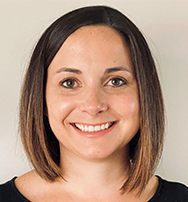
- Undergraduate
- High School
- Architecture
- American History
- Asian History
- Antique Literature
- American Literature
- Asian Literature
- Classic English Literature
- World Literature
- Creative Writing
- Linguistics
- Criminal Justice
- Legal Issues
- Anthropology
- Archaeology
- Political Science
- World Affairs
- African-American Studies
- East European Studies
- Latin-American Studies
- Native-American Studies
- West European Studies
- Family and Consumer Science
- Social Issues
- Women and Gender Studies
- Social Work
- Natural Sciences
- Pharmacology
- Earth science
- Agriculture
- Agricultural Studies
- Computer Science
- IT Management
- Mathematics
- Investments
- Engineering and Technology
- Engineering
- Aeronautics
- Medicine and Health
- Alternative Medicine
- Communications and Media
- Advertising
- Communication Strategies
- Public Relations
- Educational Theories
- Teacher's Career
- Chicago/Turabian
- Company Analysis
- Education Theories
- Shakespeare
- Canadian Studies
- Food Safety
- Relation of Global Warming and Extreme Weather Condition
- Movie Review
Admission Essay
- Annotated Bibliography
- Application Essay
- Article Critique
- Article Review
- Article Writing
- Book Review
- Business Plan
- Business Proposal
- Capstone Project
- Cover Letter
- Creative Essay
- Dissertation
- Dissertation - Abstract
- Dissertation - Conclusion
- Dissertation - Discussion
- Dissertation - Hypothesis
- Dissertation - Introduction
- Dissertation - Literature
- Dissertation - Methodology
- Dissertation - Results
- GCSE Coursework
- Grant Proposal
- Marketing Plan
- Multiple Choice Quiz
- Personal Statement
- Power Point Presentation
- Power Point Presentation With Speaker Notes
- Questionnaire
- Reaction Paper
Research Paper
- Research Proposal
- SWOT analysis
- Thesis Paper
- Online Quiz
- Literature Review
- Movie Analysis
- Statistics problem
- Math Problem
- All papers examples
- How It Works
- Money Back Policy
- Terms of Use
- Privacy Policy
- We Are Hiring
Family Nurse Practitioner, Admission Essay Example
Pages: 2
Words: 479
Hire a Writer for Custom Admission Essay
Use 10% Off Discount: "custom10" in 1 Click 👇
You are free to use it as an inspiration or a source for your own work.
My dream job is to become a Family Nurse Practitioner in an Emergency Room, Urgent Care, or Family Practice setting. I am hoping to further my education as a student at this University so that I can care for patients at a higher level of autonomy and responsibility. As a nurse, I’ve worked with patients who require different levels of care. For some patients, I am the calm presence that offers reassurance in times of crisis. For others, I lend an ear to their thoughts; providing a distraction in the midst of all the chaos. This heightened ability to empathize with those in need has developed into an unrelenting desire to provide care at an even higher level.
Growing up, I was curious to learn more about the practice of medicine. I was intrigued by health care providers and found their refined medical skills an admirable pursuit. When I was 5 years old, I lost my Mother to breast cancer. I suffered through the feelings that accompanied this tragic event and promised myself I would one day take part in minimizing these human losses. After graduating high-school, I pursued the medical field more intently. I accepted a job with the U.S. Navy where medical experience was highly diversified. I worked in Postpartum/Labor & Delivery. I was stationed on the front line, where I was responsible for assessing the health of newborns and facilitating each mother’s recovery. On occasion, I would scrub in for C-sections; the OB/GYN allowed me to cut the umbilical cord and prepare the baby for its mother’s embrace. I thrived in this role and felt blessed I could be a part of bringing new life into this world. This marked a pinnacle moment in which all my efforts were legitimized. After some time, I was relocated to the Anesthesiologist Department at the U.S. Naval Hospital in Okinawa Japan. I was responsible for intubating, administering medications, and adjusting gas at the request of my. After returning from the Navy, I worked as a nurse on the Medical/Nephrology floor, followed by 4 years in critical care on the ICU Stepdown floor. From 2004 to 2015, I worked on the Neuro, Trauma, and Surgical Intensive Care Unit.
Throughout the course of career, my desire to become a Nurse Practitioner has only grown stronger. Never once was I deterred by my experiences or complacent in just one role. I have acquired an enlightened perspective which has resulted in a profound understanding and appreciation for the health care profession. Someone once told me, “nothing worth doing is easy;” a statement I have found to be a true as I fully accept the challenges that lie ahead knowing I am fulfilling my passion. I can think of no better place to continue my education than at Sonoma State University’s Nurse Practitioner Program. Thank you for taking the time to read my heart on paper.
Stuck with your Admission Essay?
Get in touch with one of our experts for instant help!
Staples US Performance Grid, Research Paper Example
Theory of Defiance, Essay Example
Time is precious
don’t waste it!
Plagiarism-free guarantee
Privacy guarantee
Secure checkout
Money back guarantee

Related Admission Essay Samples & Examples
Clinical leadership, admission essay example.
Pages: 4
Words: 1153
A Health Care Provider, Admission Essay Example
Pages: 3
Words: 739
London School of Economics, Admission Essay Example
Words: 570
Academy of Medical Science Technology, Admission Essay Example
Words: 596
St. James School of Medicines, Admission Essay Example
Words: 614
How My Perspectives of Life and Morality Will Enable Me to Contribute to the Liberty University’s Mission, Admission Essay Example
Pages: 1
Words: 270

Why Do You Want to be a Nurse Practitioner? Carson-Newman MSN-FNP Students Answer

Learn more about Carson-Newman's online family nurse practitioner program .
"Why do you want to be a nurse practitioner?" is a question many nurses hear and consider before taking the next step in their career. Each answer is personal and an important part of your professional journey.
At Carson-Newman University, we've interviewed six students in our online MSN-Family Nurse Practitioner (FNP) program. We asked, "why do you want to be a nurse practitioner?" and our students' responses are below. If you aspire to have greater influence and autonomy in your nursing practice as an FNP, read on to gain perspective as you consider your own path.
Earn Your MSN-FNP Part-Time For Less than $30k
Lauren crowe: why do you want to be a nurse practitioner.
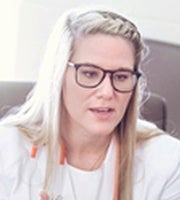
When did you decide that you wanted to be a nurse practitioner?
I always knew I wanted to continue education [as a nurse]. Nursing is a constant field of learning, and I knew that I wanted to pursue a higher level. Nurse practitioner appealed to me because I wanted to care for my patients on a different level and give the whole perspective, already having the experience as a nurse, and to give provider care as well.
What's your favorite part about being a nurse?
My patients are my favorite part of being a nurse. I enjoy going to work every day to get to care for and love people spiritually, emotionally, and physically . So that's my favorite part.
What kind of impact would you like to have on the nursing profession?
I just want my patients to feel loved, heard, and cared about. I see a lot in the world that we have—we expect patients to come to us when we should go to them. Medical missions have always been a part of my heart, too, so I hope to be able to help in that aspect as well.
Mary Catherine Hefner: Why do you want to be a nurse practitioner?
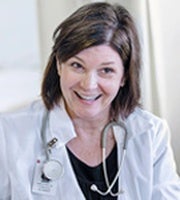
Why did you decide you wanted to become a nurse practitioner?
It's been my goal for 20 years to be a nurse practitioner, and life happens. It just so happened that life fell into place and it worked out through Carson-Newman for me to join their first cohort of the online [FNP] program.
My favorite part about being a nurse is helping others improve their quality of life and in doing that, I try to leave patients in a better frame of mind or a better state of health than I find them in.
I certainly hope [with] my little piece of the puzzle that I can contribute to the big picture and will be impactful—not only on the side of patient care but also in representing family nurse practitioners positively... so we can practice at the upper end of our license and be a voice for patients and the profession .
"I certainly hope to be... a voice for patients and the profession."
Miranda Kerley: Why do you want to be a nurse practitioner?
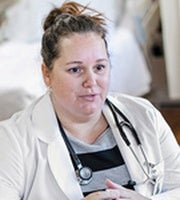
I actually started a program, but due to clinical placement , I stopped because I couldn't find anywhere to do clinicals. Then my husband pushed me to get my master's because he thought I'd be good at it. I agreed and... that was probably four years ago.
I work in the ER, so I get to deal with anything and everything. Every patient's different. Every experience is different. I just love the variety of what I get to deal with every day I go to work. [It's] never the same.
What attracted you to the program at Carson-Newman and how did you know it was a good fit for you?
One of the big attractions was an advertisement for clinical placement. The area that I'm from -- Charleston, South Carolina -- we have probably five to seven different nursing programs, so there are students everywhere.
We have the Medical University also, so we're just jam-packed. Finding clinical placements is super hard. You could wait six months before you get in somewhere, so it really slows down your progress. When I saw Carson-Newman was willing to find placement for me, I jumped on board very quickly.
"Finding clinical placements is super hard… When I saw Carson-Newman was willing to find placement for me, I jumped on board very quickly."
Amanda Lane: Why do you want to be a nurse practitioner?
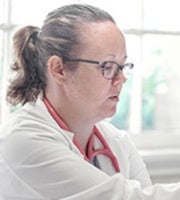
I have my master's already in Nursing Administration, but I want to do more with patient care. I work in a free clinic one day a week in my hometown and I really enjoy providing that care . I want to do what nurse practitioners can [do]— provide mid-level care .
I love interacting with my patients and establishing a rapport with them.
It's close [to me]. I knew if there were any issues that I'd be only an hour and a half away.
I like the fact that it's online and only one class a semester , so it's doable with being able to be focused on my family and work. Family is the most important thing to me, so it's important to still be able to go to their games and concerts.
Nichole Luckshis: Why do you want to be a nurse practitioner?

I have wanted to be a nurse practitioner ever since I started nursing. Early on, I knew I'd love to teach… and I'd love to educate patients . In our field, I feel like education kind of lacks, especially with health care with patients—they're not given the education that they need [for] medicines or why they have disease processes.
I would love to be that person, especially as a nurse practitioner—to not only provide care and manage that care for them but to be able to educate and tell them why .
What is your favorite part about being a nurse?
There are so many parts that I love about being a nurse. Generally, [it's] the relationships we gather with patients . You get to be there at special parts of their life—whether they're sick, whether they're happy. I'm an emergency room nurse, so it's just being there when patients are sick. You can comfort family members, you can comfort the patients, and just take care of them.
I'm huge on education—I love to teach other nurses and I love to educate patients. I want to, first, just provide good care, and second, just be able to make an impact with patients on the education of disease processes and everything that they're going through.
Rhonda McAnally: Why do you want to be a nurse practitioner?
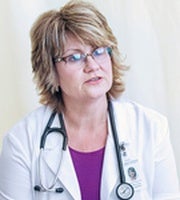
When did you decide you wanted to be a nurse practitioner?
I've been away from bedside nursing for about 10 years and am in more of an education and administrator role at a hospital. The reason I wanted to become a nurse practitioner is [that] I really miss the patient interaction ... I have been looking for a flexible program where I could fulfill my lifelong dream of becoming a nurse practitioner.
My favorite part of being a nurse is the patient interaction and the variety of patients that you see [each] day. Every day is a new challenge, a new expectation, a potential diagnosis or something to learn. Being a nurse is just continually learning and trying to improve your skill set and knowledge.
An impact that I want to make...is to show that individuals can get exceptional care and holistic care . I also [want to] be an adjunct to the physicians, or surgeons, in providing... more of a holistic approach to nursing . Also, to [be a mentor to] other nurses to fulfill their dreams— it's never too late to learn something new and acquire knowledge to help another individual. I believe that some of that is missing with the healthcare profession today.
People do not need to be treated like a number. They need to be treated with compassion; they need to be treated with respect.
I feel like the nurse practitioner role [expands] to where you're spending more time with your patients and truly educating them about their conditions.
"People do not need to be treated like a number. They need to be treated with compassion; they need to be treated with respect."


It's Your Turn: Why do you want to be a nurse practitioner?
There isn't just one answer to the question "Why do you want to be a nurse practitioner?" Still, here are several reasons to consider becoming one:
- Employment of nurse practitioners is expected to grow 28% through 2028 , almost six times the average growth rate of all other occupations.
- FNPs can work in a variety of settings including hospitals, schools, outpatient clinics, and community health centers.
- In some states, FNPs can practice independently and open their own practice.
- FNPs can also pursue subspecialties including medical-surgical, cardiac, endocrine/diabetes, and more.
- In many states, nurse practitioners have what's referred to as "full practice authority" , meaning they do not have to work under the supervision of a doctor and can provide complete patient care. This includes full exams, prescribing medicine, and more.
- The average annual income for FNPs is $110,030, substantially higher than RN positions. Even though pay varies by state, even in the lowest paying states, FNPs make $40,000 more than the national average for all other occupations.
It's no wonder that U.S. News & World Report ranks nurse practitioner as #4 among "Best Healthcare Jobs" (one place ahead of physician) and among the top seven for "100 Best Jobs."
Learn more about the benefits of becoming a nurse practitioner and broaden your impact in healthcare as a nurse practitioner.
Advance your nursing career with Carson-Newman's online MSN-FNP program or online post-master's FNP Certificate program .
Request Your Free Program Brochure

9 Tips for Writing the Perfect NP Program Application Essay
While many NP program application deadlines are still months away, now is the perfect, stress-free time to start getting your application materials together. Filling out endless amounts of personal information, gathering transcripts and requesting letters of recommendations is easy. The application essay? Not so much.
We all hate responding to the types of questions NP program applications typically ask. “Why do you want to become a nurse practitioner?” and “Talk about a time you overcame a challenge” can be difficult questions to answer…eloquently at least. Responding by saying you want to become an NP “so you can make decent money and aren’t sure what else to do with your life” isn’t going to cut it.
Fortunately, there are a few things you can do to make sure your admissions essays are top notch.
- Get Specific – Most application essay questions are generic. This doesn’t mean your response should follow suit. Rather than describing how you feel about a topic, give details. Outline a specific example from your own personal experience. This makes your essay more interesting and memorable while highlighting your experience and personality.
- Keep it Simple – Admissions staff want to read an essay, not a novel. Avoid verbosity keeping your essay simple and succinct but complete. Make sure to stick to specified length guidelines. They are there for a reason.
- Understand the Role of a Nurse Practitioner -NP program faculty want to know that you understand the role of nurse practitioners . Make sure you accurately present the NP profession in your essay responses. If you aren’t quite sure what an NP does, job shadow an NP or two for a day to learn more about the career before applying.
- Be Concrete -Even if you aren’t 100% sure what your future holds, explain your future plans and goals as if they are set in stone. Saying you “might” do this or you “hope” to do that isn’t as powerful as saying you “will”.
- Keep Your Essay Appropriately Personal – Many essay topics ask you to explain a time you overcame an obstacle or hardship in life. If your life’s major challenge has been extremely personal, choose something else to discuss in your essay. Don’t mention your marriage woes or your teen’s problems with the law to admissions staff. Instead, choose something career or volunteer related (but not trivial) even if it isn’t actually your life’s most insurmountable obstacle.
- Follow Directions – Yes, you learned this in kindergarden but some of us still have trouble sticking to guidelines. If a school asks for an essay written in APA format, for example, make sure you exhaustively research APA requirements and format your essay appropriately.
- Brag a Little -Application essays are your chance to shine . Highlight your career, education and experience. If you have volunteered extensively or worked in the medical field, share examples of your experiences and how they have helped shape your interest in becoming a nurse practitioner.
- Stick with Facts Over Characteristics -When describing yourself in your application essay, examples and facts speak louder than description. Anyone can say, for example, they are hardworking. If you can describe your involvement in multiple nursing organizations while raising a family and working full-time in the ICU, however, this proves your industrious character.
- Edit, Edit, Edit -Nothing ruins an application essay like typos and misspellings. Look over your essay multiple times continuing to refine your work. Then, share it with family, friends and colleagues asking for feedback. The more eyes you have read your essays before submitting your application, the better.
NP program faculty are looking at your essays as samples of your writing ability. Start your application essays early making sure you have enough time to review them thoroughly. You wouldn’t want a poorly written writing sample to hurt your chances of admission.
Questions about your NP program application essay? Ask other NP’s their opinions by commenting below.
You Might Also Like: A Sneak Peak Into the World of NP Program Admissions

- Accelerated Bachelors of Science in Nursing
- Doctor of Nursing Practice (DNP) - Executive Nurse Leadership
- Family Nurse Practitioner Track
- Neonatal Nurse Practitioner Track
- Nurse-Midwifery Track
- Pediatric Nurse Practitioner Track
- Adult-Gerontology Acute Care Nurse Practitioner Track
- Psychiatric Mental Health Nurse Practitioner Track
- Rankings and Recognition
- Accreditation and Affiliations
- Career Resources
- Clinical Placement Support
- Faculty Profiles
- Message from the Dean
- State Authorization
- Student Services and Support
- Student Testimonials
- Why Baylor University Online?
- Frequently Asked Questions
- Baylor In the News
- Become a Student
7 Reasons Why You Should Become a Family Nurse Practitioner

Our healthcare needs are growing, and yet we are facing a massive shortage of primary healthcare providers. The good news, according to Reuters, is that nurse practitioners may be poised to fill that gap . The key may lie in state regulations and finding enough nurse practitioners to work in underserved areas.
The Family Nurse Practitioner can fill this gap in healthcare by working within a diverse healthcare system including physicians, and other professional practitioners. In most states, nurse practitioners are able to write prescriptions and practice independently under a collaborative agreement with a physician. There is a growing list of states that allow the nurse practitioner to practice autonomously to the full extent of his/her education without physician oversight.
A Family Nurse Practitioner provides primary healthcare to patients across the lifespan. As a Family Nurse Practitioner, you will have a positive impact on the health outcomes of your patients. If you are thinking about becoming a Family Nurse Practitioner, there are many advantages for doing so.
Your Schooling May Not Cost You Anything
Does this sound too good to be true? Family Nurse Practitioners are in high demand in areas where people may not have access to needed medical services (underserved or low resource community). The Health Resource and Services Administration (HRSA) offers the NURSE Corps Loan Repayment Program to help pay off your student loans if you work for a certain amount of time in an underserved area or a critical shortage facility. In addition to being eligible for loan repayment, you will be serving a community in need.
You Can Study Without Giving Up Your Current Job
More universities are offering an online nurse practitioner program, meaning that you can take courses from anywhere you have an internet connection. For instance, you can participate in Baylor’s Family nurse practitioner program in Texas even if you live in another state. Because you will be going to school online and don’t have to move to be near campus, you can keep your current job, home, and lifestyle.
How many years of schooling does it take to become a Family Nurse Practitioner with a Doctor of Nursing Practice degree? To earn a Doctor of Nursing Practice, it will take three to four years beyond obtaining your Baccalaureate of Science in Nursing degree (BSN). Our program offers both a full-time and part-time option for students. Those who choose to go full time will finish sooner.
Learn more about Baylor's Online DNP-FNP program
Family Nurse Practitioner is a Growing Career
The number of nurse practitioners in the United States nearly doubled from 2007-2017 from 120,000 to 234,00 and according to the Bureau of Labor Statistics is expected to grow another 31% before 2026. This growth is spurred in large part due to a few things.
- Emphasis on preventative care - Holistic care before someone gets sick is much more desirable and economical than the treatment of disease.
- An aging population - More people are living longer, and the need for preventative care into their senior years is spurring the demand for more nurse practitioners.
- The changing face of healthcare - Government regulations, insurance changes, and public perceptions are leading to a healthcare transformation that family nurse practitioners are at the center of.
In a growing field, it’s unlikely that graduating students will have any trouble finding work.
You Can Work Anywhere
As a Family Nurse Practitioner, there is equal demand in both urban and rural settings. There are also other changes coming to healthcare, like the growing field of telemedicine, which means that you may be able to see patients and work with them at a distance.
As wearables and smart devices become more popular, you may soon have fewer patients visiting your offices for appointments. These exciting changes mean you can work from anywhere in the world and be in on bringing new levels of collaboration and care .
You’ll Have Higher Earning Potential
The median income for Family Nurse Practitioners in 2017 was $110,930 per year, according to the Bureau of Labor Statistics. Comparatively the median salary for a Registered Nurse is $70,000 annually. In addition, family nurse practitioners have a lot more control over their career paths with options to open their own practice or practice as part of a larger healthcare group.
You Work Directly with People of All Ages
As a Family Nurse Practitioner , you will have a diverse patient population. You will provide care to entire families and individuals across the age span from infants to grandparents. Often families will choose one primary care provider for everyone in their household and that could be you!
You’ll Hold a Respected Profession
A Family Nurse Practitioner serves their community and is very well respected for the services they provide. As a family nurse practitioner, you can take pride in what you do and the people you help each day.
Whether you pursue your Doctor of Nursing Practice - Family Nurse Practitioner degree online or on-campus, where you attend school matters. Baylor University's Louise Herrington School of Nursing Online program is nationally ranked and nationally certified. The school of nursing has faculty who are nationally recognized and experienced in providing an Advanced Practice education. This outstanding faculty along with a comprehensive curriculum will guide you to be a knowledgeable and competent healthcare provider. While most of your work will be done online, the program does have on-campus immersions spread throughout the program to help develop your assessment and management skills.
If you already have your BSN or another advanced nursing degree, consider enrolling in our online dnp-fnp today. Now is the time to take charge of your future!

Why Become a Family Nurse Practitioner (FNP)?
A Family Nurse Practitioner (FNP) is an advanced practice registered nurse that specializes in health care across the age spectrum. They have great autonomy within the medical field, often acting as primary care providers, and have advanced skillsets to carry out patient care. For instance, FNPs conduct physical examinations, create treatment plans, maintain medical records, and are able to prescribe medications. For this reason, becoming a Family Nurse Practitioner requires a graduate degree and certification.
As one Goodwin University FNP program student explained, “Being a Family Nurse Practitioner gets me close to being a doctor without losing my caring side as a nurse.” Aspiring FNPs may also feel this way, or are drawn to the family practice specialty for diverse reasons. For some, it’s the challenging coursework that piques some their interest. Others are motivated by the high earning potential that you can expect as an FNP. What else makes the FNP role so interesting, and why should you become a Family Nurse Practitioner? Let’s find out.
Family Nurse Practitioners: Popular for a Reason
Did you know that the majority of nurse practitioners (NPs) in the U.S. are in fact Family Nurse Practitioners? According to the American Association of Nurse Practitioners (AANP), almost 67% of NPs are actually FNPs . Many FNPs enjoy the diversity of their jobs, as they work with patients of all ages, shapes, and feathers. The focus of a Family Nurse Practitioner is to promote a healthy lifestyle throughout the lifespan, focusing on preventive care. Some further job responsibilities of FNPs include creating treatment plans, managing acute and chronic illnesses in patients, and ordering diagnostic exams. Educating patients is also a large part of the FNP job. The FNP option for RNs is attractive to many advanced practice nurses because of this deep engagement with patients.
Family Nurse Practitioners might work in private practice, at colleges and universities, or in community health. No matter the setting, the collaborative aspect of working with patients to maintain healthy lives is a fulfilling part of this career for FNPs. Many FNPs remark on how this career feels like being a doctor, without medical school bills, a long residency, and many of the stressors that come with such a level of responsibility (such as being on-call). The work/life balance might be more level for FNPs than for PhDs.
A Flexible Ladder
A bachelor’s degree and an unencumbered RN license are the major admission requirements for applying to a Family Nurse Practitioner program of study. Goodwin University also asks that applicants have obtained at least two years of direct patient care as an RN within the last five years. You’ll need to share transcripts, a resume, and a formal essay, but there are no other tests (such as the GRE) that need to be taken before you submit your application. If you’ve climbed this far but are concerned about other obligations, such as your job or family, then you need a flexible program that works for your lifestyle.
Besides Orientation, two Immersion Weekends, and clinical practice, the Goodwin University FNP program is available entirely online. This format allows you to study when you can, and continue to live your life and work while making big moves professionally.
An Unmatched Learning Opportunity
The depth of the curriculum included in Goodwin University’s FNP program is impressive and valuable. This makes sense, because the FNP job requires an in-depth understanding of health practices for adults (including complex cases), children, and women. At Goodwin University, you can expect to study a mixture of theory and clinical studies, including:
- Pathophysiology, Pharmacology, and Physical Assessment for Advanced Nursing Practice
- Theoretical Basis and Current Concepts/Professional Roles
- Policy, Politics and Organization of Healthcare
- Advanced Reasoning and Differential Diagnosis
In addition, you’ll spend 600 hours spread across three ‘Advance Practice through the Lifespan’ courses, which cover the following demographics: adults, women, pediatrics, and complex clients. This 47-credit master’s program can be completed in as few as 27 months when studying year-round.
Another important consideration for your future FNP program is accreditation. Being accredited means that the curriculum has been vetted and approved by an overseeing institution. Accreditation ensures the highest quality educational program. Goodwin University’s FNP program is accredited by the Commission on Collegiate Nursing Education (CCNE).
Lucrative Compensation & A Great Job Outlook
On average, the Bureau of Labor Statistics tells us that nurse practitioners make about $109,820 annually, nationwide. However, more specific information about the Family Nurse Practitioner salary is available through the AANP, who found that full-time FNPs make on average $114,000 annually in 2019. Depending on the state in which you work, as well as the work environment, your earning potential will also adjust. In Connecticut, for example, the FNP salary can reach up to $136,580 annually .
Perhaps more impressive than the salary for FNPs is the job outlook. The average growth rate for all occupations in the United States is 4% between 2019-29. The growth rate for nurse practitioner employment during that same time range, however, is rising much faster than average, at a notable 52%. This means that employment of nurse practitioners is growing at 13 times the rate of the national average! The highest employment levels for nurse practitioners in a metropolitan area are found on the east coast. In the New York, Newark, Jersey City, and PA area, there are 13,910 FNPs! The mean wage of these nurses is also above the national average, at $128,720.
More of What You Love About Nursing
As you can see, becoming a Family Nurse Practitioner is a great choice for driven BSN graduates who want to grow their professional career, and live up to tall personal aspirations. To learn more about how to become a Family Nurse Practitioner , or why an FNP program may be the right route for you, consider contacting Goodwin University today at 800-889-3282.

Goodwin University is a nonprofit institution of higher education and is accredited by the New England Commission of Higher Education (NECHE), formerly known as the New England Association of Schools and Colleges (NEASC). Goodwin University was founded in 1999, with the goal of serving a diverse student population with career-focused degree programs that lead to strong employment outcomes.

- Application Requirements
- Tuition & Financial Aid
- Transfer Credits
- Financial Aid FAQ
- What Can You Do With a Computer Science Degree?
- What Can You Do With a Marketing Degree?
- What Is RN to BSN
- Curriculum & Practical Experiences
- Double Shark Scholarship
- Leadership & Faculty
- Career Services
- How To Become a Behavior Analyst
- Library and Information Science (MS)
- Curriculum & In-Person Experiences
- What is an FNP?
- Course Sequence Page
- Course Description
- Nutrition and Health Promotion (MS)
- Behavior Analysis (PhD)
- Apply Now External link: open_in_new
Home / Blog
Five Reasons Why Registered Nurses Become Family Nurse Practitioners
In the early stages of their careers, some nurses often feel like they will never learn enough to stay afloat. As they make mistakes and find small victories, just getting control of the basics can seem overwhelming. But with time and training, their confidence blooms — turning them into skilled, focused nurses who love to care for their patients and are driven to make a difference.
It is the drive to do more that prompts many nurses to pursue a path from a Registered Nurse to Family Nurse Practitioner (FNP). Going beyond the hospital bedside, FNPs have greater autonomy, career growth, and personal satisfaction.
Here are five reasons why nurses choose to become FNPs.
Improved Professional Responsibility and Flexibility
Nurse practitioners (NPs) work in a variety of settings including clinics, hospitals, schools, urgent care centers, and private practices. With the skills to treat patients from onset of illness through recovery, FNPs may assess, diagnose, order tests, and even admit patients to the hospital when necessary. Providing seamless care means more positive clinical outcomes for patients and a better bottom dollar for many medical facilities as well.
Increased Job Prospects
With a looming shortage of primary care physicians on the horizon, contributions from FNPs are being encouraged. With a steadily rising job market and recognition by multiple media sources, nurse practitioner programs have been ranked among the top 10 for potential job growth according to a 2009 ranking by CNN Money . The Bureau of Labor Statistics predicts a 23 percent increase in overall nursing jobs between 2008 and 2018 and steadily rising rates of NPs providing primary care.
Better Earning Potential
Nurse practitioners do make more money than RNs, and pay will vary based on the area of specialization, years of experience, and geographic location. According to the National Salary Survey, NPs reported an average salary of over $90,000 per year. In addition to pay, hard-to-fill positions are usually combined with lucrative benefit and bonus packages to entice practitioners to work in certain geographical areas.
Increased Autonomy
Nurse practitioners continue to take on greater responsibilities and have gained significant ground in the fight for patient autonomy. Seventeen states currently allow NPs to work without a supervising physician, and five other states are considering similar measures. With more than 30 million Americans set to receive health care in the near future, leaders are reassessing the value of NPs in managing this influx. This includes adopting additional licensing and a broader scope of practice.
Ability to Provide Primary and/or Preventive Care
According to the website Health Affairs.org , primary care nurse practitioners (those working in pediatrics, geriatrics, family medicine, gerontology, and women’s health) made up 84 percent of all NP graduates in 2012. NPs come in far ahead of sagging medical school numbers for the same field, at just 11.6 percent of their overall enrollment. Not all nurse practitioners who train in a primary care field end up working there — estimates show about 50 percent usually do — but there’s still plenty of room for providers to find their spot.
Making a difference for patients is at the center of all that FNPs do. From birth through end of life, FNPs provide care across the life span and face a bright and promising future in this ever-changing health care system. There has never been a better time to get started on your own path to FNP training. Nursing@Simmons makes it easy to train with some of the country’s leading FNPs and gain top-notch experience in an interactive, online platform. With convenient online graduate programs available, there are plenty of compelling reasons to consider progressing from a Registered Nurse to Family Nurse Practitioner and take your career to the next level.
Request Information
WCU » Blog » 7 Reasons to Become a Family Nurse Practitioner
7 Reasons to Become a Family Nurse Practitioner
November 21st, 2019
Read Time 4 mins
A Family Nurse Practitioner is someone who offers more in-depth and comprehensive care compared to registered nurses. Being an FNP (Family Nurse Practitioner) means added responsibility and a variety of career prospects.
Working toward becoming an FNP might be a natural progression to many practicing registered nurses. For those wondering if this is the right move for their career, read more to understand the reasons why registered nurses aspire to be Family Nurse Practitioners.
Reasons to Become a Family Nurse Practitioner
Greater Autonomy and Responsibility
Family Nurse Practitioners have a few duties that overlap with the duties of registered nurses; such as, examining patients, monitoring patient health, maintaining health records, etc. However, the duties of an FNP go beyond this as they can make a medical diagnosis, develop comprehensive health plans for patients, monitor chronic health conditions and supervise healthcare teams.
Since FNPs generally offer more in-depth and comprehensive care, they can assume greater healthcare management roles.
Prescription Authority
FNPs have greater autonomy when it comes to prescription authority. Currently 22 states and the District of Columbia allow full practice, which means nurse practitioners have similar prescriptive authority compared to physicians. In 16 states, there is reduced practice, where nurse practitioners can prescribe as long as they are in collaborative agreement with the physician, along with staying within the limitations of the medications they are allowed to prescribe. According to a survey by AANP, most nurse practitioners hold some form of prescriptive privileges, which includes controlled substances, in all 50 states and D.C.
Better Career stability
Jobs in healthcare are projected to grow around 36% From 2016 to 2026. With such a high demand, healthcare organizations and hospitals are keen to retain highly qualified family nurse practitioners. This offers greater stability (financial and professional) and growth opportunities in career.
Work While You Learn
Some colleges offer family nurse practitioner courses online. This means that registered nurse practitioners can continue working while studying to be FNPs. This ensures that a registered nurse does not have to take a break to pursue higher education.
West Coast University (WCU) offers an online MSN – Family Nurse Practitioner program. The University is institutionally accredited by WASC Senior College and University Commission (WSCUC). WCU’s online nursing education programs are programmatically accredited by the Commission on Collegiate Nursing Education (CCNE.)
Maintain Connections with Patients
Many registered nurses prefer and thrive in the connection with patients that their profession offers. As they obtain higher positions, many nurses lose out on that patient-connection. However, as FNPs, nurses continue to work closely with patients and physicians.
Leadership Roles
Many healthcare settings require FNPs. Apart From independent practice, family nurse practitioners can also look forward to increased leadership opportunities. Extended fields like patient education, research, and academia, and policy advocacy have seen a rising need for qualified healthcare professionals like FNPs to help their causes.
Family nurse practitioners can work actively in developing patient education programs, conduct medical research and have a say in healthcare policy matters. Qualified family nurse practitioners are also essential in academic roles like program administrators and mentoring.
Greater Fulfilment
A Family Nurse Practitioner is able to work across the entire spectrum of patients and assumes a greater responsibility in terms of patient care. According to the American Association of Nurse Practitioners, 87.1% of NPs are certified in an area of primary care, and 72.6% of all NPs deliver primary care. This means that most FNPs have a chance at having a greater impact on health communities. As many FNP’s have prescriptive authority, they offer healthcare services which are cost-effective and can be utilized by a larger percentage of the population.
Apart From these core reasons described above, a career as a Family Nurse Practitioner could make a difference in the lives of people.
WCU cannot guarantee employment.
WCU provides career guidance and assistance but cannot guarantee employment. The views and opinions expressed are those of the individuals and do not necessarily reflect the beliefs or position of the school or of any instructor or student.
Share This Article
Share this definition, related articles.
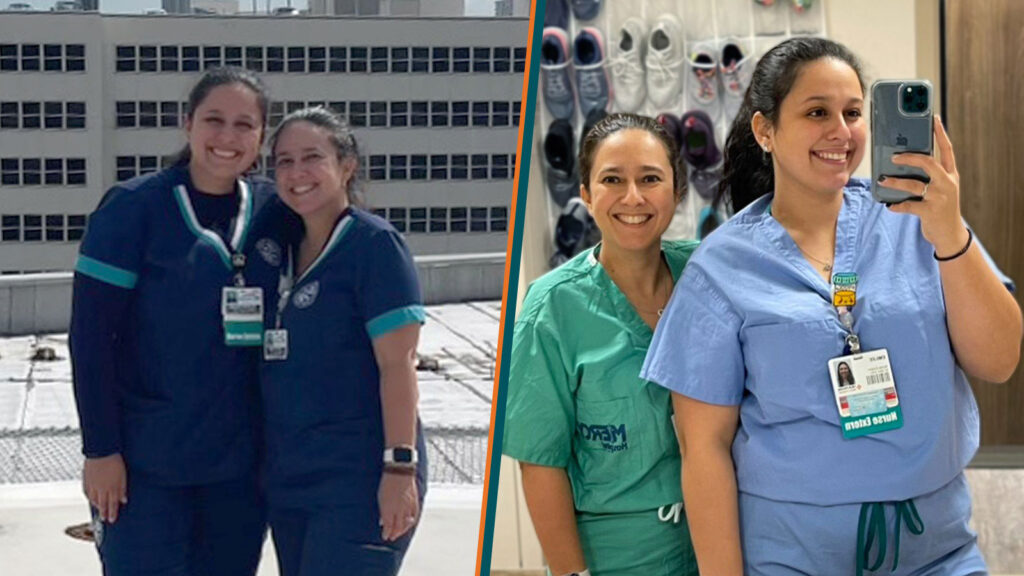
May 10th, 2024
Shared Dreams: A Mother-Daughter Journey Through Nursing School
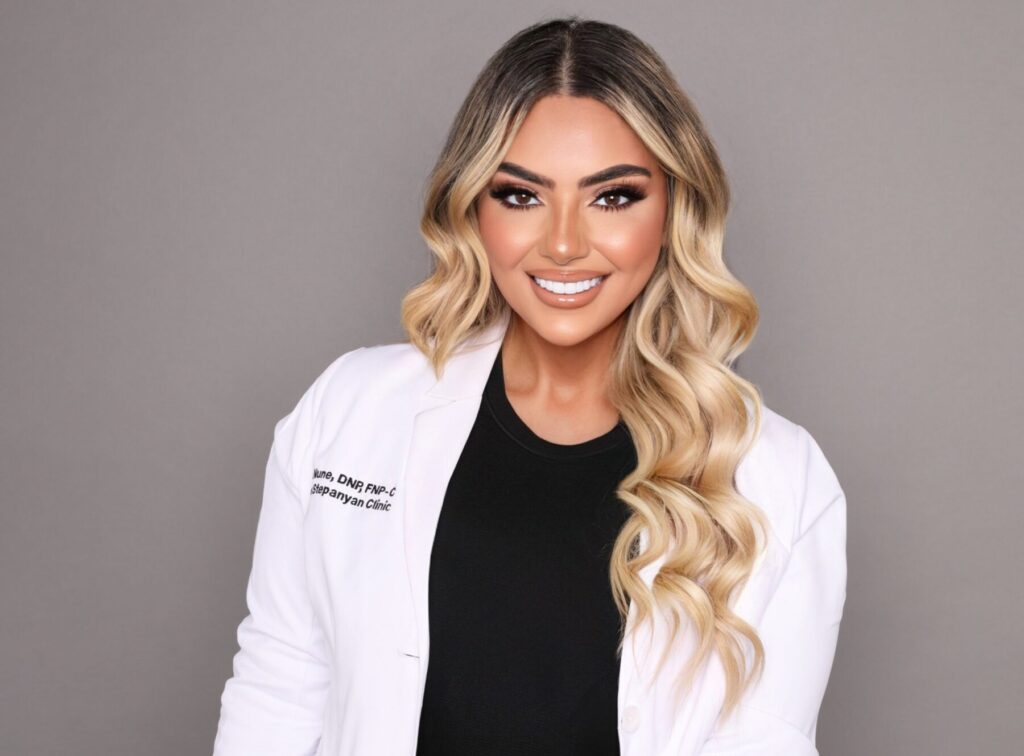
July 19th, 2023
Read Time 5 mins
WCU Alumni Q&A: Nune Stepanyan, DNP ’21, MSN-FNP ’19, BSN ’16

November 15th, 2022
Double Alumna Finds Family in WCU Cohort
Request info, start your journey.
- Flexible online and campus programs
- 58,000 alumni across the globe
- Experienced faculty and staff
" * " indicates required fields
By clicking below, I consent to receive calls, emails and/or text messages* by a college representative with information for educational opportunities at the number(s) provided above. I understand calls may be initiated by an automated telephone dialing system. I need not grant this consent to receive information or to be eligible to enroll with WCU. I understand that I am not required to provide consent as a condition of any purchase. I also understand that I may revoke my consent at any time in accordance with WCU's Opt-Out Disclaimer. This site is protected by reCAPTCHA and the Google Privacy Policy and Terms of Service apply. *Standard rates may apply. Disclaimer I understand that if I no longer wish to receive text messages from WCU, I may revoke my consent at any time by texting back "Stop" to unsubscribe from the service. I understand that if I no longer wish to receive emails, I may revoke my consent at any time by clicking the "Unsubscribe" link within any email I receive from WCU. I understand I may revoke my consent to receive calls by informing any WCU associate calling me that I no longer want to receive calls from WCU.
Personal Information you submit through our Sites, such as your name, address and other contact information, may be collected by West Coast University for internal marketing and development purposes as well as to respond to your inquiry, complete a transaction for you, or fulfill other forms of customer service. You can choose not to receive marketing from us by “unsubscribing” using the instructions in any marketing email you receive from us.
Click here to learn more.
Home — Essay Samples — Life — Nurse — My Passion For Helping People: Why I Want to be a Nurse
My Passion for Helping People: Why I Want to Be a Nurse
- Categories: Career Goals Nurse
About this sample

Words: 819 |
Published: Apr 2, 2020
Words: 819 | Pages: 2 | 5 min read
Hook Examples for Nursing Essay
- A Personal Revelation: One day, amidst the chaos of a busy hospital, I had a moment of clarity. It was in that instant that I realized my calling—to be a nurse. Join me on my journey to understand the profound reasons behind my unwavering passion for helping others.
- An Inspiring Anecdote: As I held the hand of a patient in pain, I felt a deep connection that transcended the medical procedures. Let me share this transformative experience and how it fueled my desire to pursue a career in nursing.
- A Guiding Philosophy: Florence Nightingale once said, “I attribute my success to this: I never gave or took an excuse.” Explore with me how Nightingale’s dedication to care and compassion resonates with my own passion for nursing.
- A Lifelong Dream: Since childhood, I’ve envisioned myself in the white coat of a nurse, tending to those in need. Discover the roots of this dream and how it has evolved into a burning passion that drives me toward this noble profession.
- An Empathetic Reflection: Mark Twain once wrote, “Kindness is the language which the deaf can hear and the blind can see.” Join me as I explore how my passion for nursing is deeply rooted in the language of kindness, empathy, and a relentless desire to alleviate suffering.
Works Cited
- American Nurses Association. (2021). What is nursing? Retrieved from https://www.nursingworld.org/practice-policy/workforce/what-is-nursing/
- Royal College of Nursing. (2021). Why become a nurse? Retrieved from https://www.rcn.org.uk/students/become-a-nurse/why-become-a-nurse
- Cherry, B., & Jacob, S. R. (2018). Contemporary nursing: Issues, trends, & management (8th ed.). Elsevier.
- Drennan, J. (2018). What makes a good nurse? Why the virtues are important for nursing. Nursing Philosophy, 19(1), e12203. doi:10.1111/nup.12203
- International Council of Nurses. (2019). Nurses: A voice to lead – Health for all. Retrieved from https://www.icn.ch/
- Halcomb, E. J., Davidson, P. M., & Daly, J. (2006). Lifelong learning in nursing: A Delphi study. Journal of Continuing Education in Nursing, 37(2), 74-80. doi:10.3928/0022-0124-20060301-09
- Yoder-Wise, P. S. (2019). Leading and managing in nursing (7th ed.). Elsevier.
- UK Council of Deans of Health. (2021). Studying nursing in the UK. Retrieved from https://councilofdeans.org.uk/student-info/studying-nursing-in-the-uk/
- British Council. (n.d.). Study in the UK: The complete guide for international students. Retrieved from https://study-uk.britishcouncil.org/
- London South Bank University. (n.d.). School of Health and Social Care. Retrieved from https://www.lsbu.ac.uk/study/schools/health-and-social-care

Cite this Essay
Let us write you an essay from scratch
- 450+ experts on 30 subjects ready to help
- Custom essay delivered in as few as 3 hours
Get high-quality help

Verified writer
- Expert in: Life

+ 120 experts online
By clicking “Check Writers’ Offers”, you agree to our terms of service and privacy policy . We’ll occasionally send you promo and account related email
No need to pay just yet!
Related Essays
2 pages / 968 words
2 pages / 933 words
3 pages / 1353 words
4 pages / 1642 words
Remember! This is just a sample.
You can get your custom paper by one of our expert writers.
121 writers online
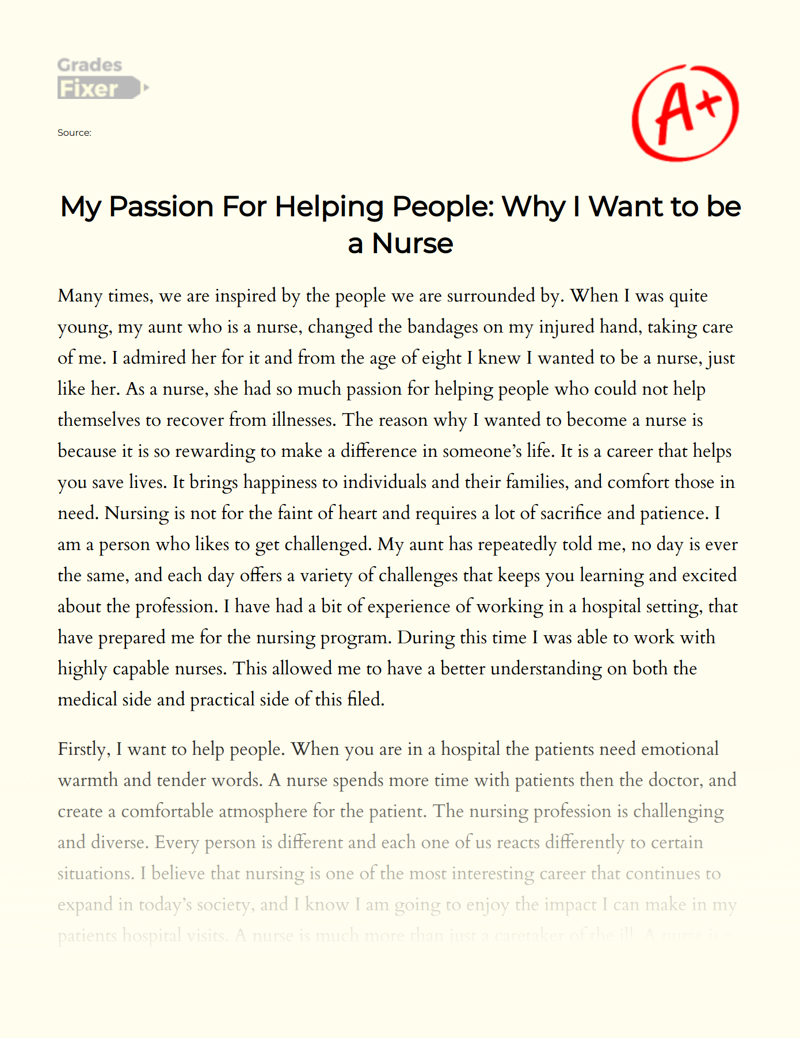
Still can’t find what you need?
Browse our vast selection of original essay samples, each expertly formatted and styled
Related Essays on Nurse
In a world filled with countless career paths and opportunities, the decision to become a nurse is one that requires a special kind of dedication, compassion, and resilience. From the bustling emergency room to the quiet halls [...]
The decision to pursue a career as a labor and delivery nurse is deeply rooted in my passion for healthcare and my unwavering commitment to providing support during one of life's most significant moments. In this essay, I will [...]
The nursing shortage in the healthcare industry has become an increasingly pressing issue in recent years. According to the American Association of Colleges of Nursing, the United States could experience a shortage of [...]
Agency for Healthcare Research and Quality. (n.d.). The Role of Information Technology in Improving Health Care.
Why do you want to become a nurse? When being asked such question I would respond that Nurse Practitioner is a great occupation for me because it satisfies my personality, interests, and values. I took two personality tests and [...]
The George Washington UniversityMedStar Washington Hospital Center is the largest hospital in Washington D.C.; With 926 beds and roughly 2400 employees within MWHC’s nursing department, it is also among the 50 largest in the [...]
Related Topics
By clicking “Send”, you agree to our Terms of service and Privacy statement . We will occasionally send you account related emails.
Where do you want us to send this sample?
By clicking “Continue”, you agree to our terms of service and privacy policy.
Be careful. This essay is not unique
This essay was donated by a student and is likely to have been used and submitted before
Download this Sample
Free samples may contain mistakes and not unique parts
Sorry, we could not paraphrase this essay. Our professional writers can rewrite it and get you a unique paper.
Please check your inbox.
We can write you a custom essay that will follow your exact instructions and meet the deadlines. Let's fix your grades together!
Get Your Personalized Essay in 3 Hours or Less!
We use cookies to personalyze your web-site experience. By continuing we’ll assume you board with our cookie policy .
- Instructions Followed To The Letter
- Deadlines Met At Every Stage
- Unique And Plagiarism Free
We use cookies on our website to support technical features that enhance your user experience, and to help us improve our website. By continuing to use this website, you accept our privacy policy .
- Student Login
- No-Cost Professional Certificates
- Call Us: 888-549-6755
- 888-559-6763
- Search site Search our site Search Now Close
- Request Info
Skip to Content (Press Enter)
Where Do Nurse Practitioners Work? 8 Places You Could Be as an NP
By Brianna Flavin on 05/23/2024
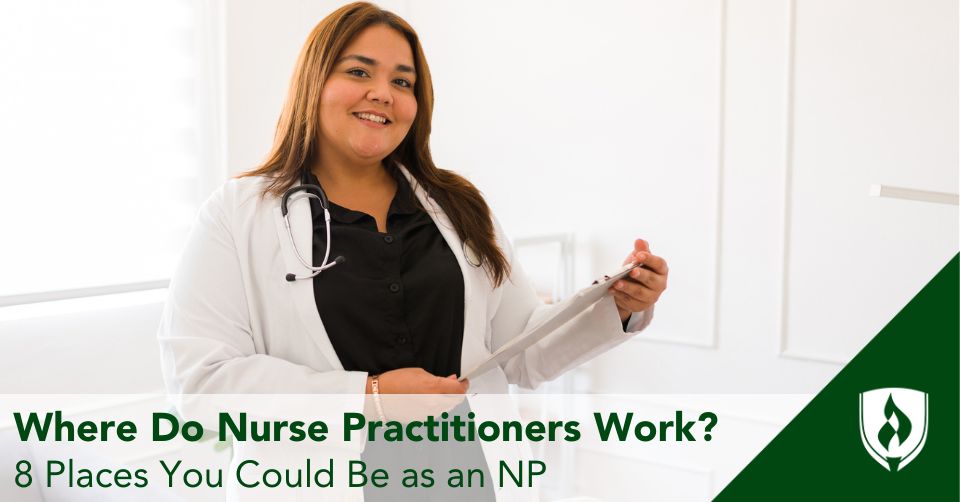
If working as a nurse is like flying on a commercial airline, then working as a nurse practitioner (NP) is like getting certified to fly your own, private helicopter. You go from squishing into roles with rigid parameters and no legroom, to a burst of autonomy and options.
You still have critical rules to follow—even more so. But as a nurse practitioner, you'll have the training to act with more independence.
Nurse practitioners are advanced practice registered nurses (APRNs) who can prescribe medication, diagnose conditions, order diagnostic testing (like blood labs or X-rays) and more.
But does that make much of a difference in terms of the working environment? Do nurse practitioners work on the same floors as registered nurses in the hospital? Do they work in long-term care facilities too?
You might be asking where do nurse practitioners work if you are looking to make a change from your current nursing role—or if you're a prospective nurse exploring all your options. In any case, read on! These advanced practice registered nurses have their own, unique career landscape in the nursing industry. And it's only growing.
Nurse practitioners work in...
1. Clinics and physician offices
Primary care is the most common destination for nurse practitioners by a fair margin. In 2022, 88% of nurse practitioners were certified in an area of primary care, and 70.3% of all NPs delivered primary care, according to the American Association of Nurse Practitioners (AANP ® ). 1
Whether this looks like a family nurse practitioner handling basic medical care from a clinic or a nurse practitioner who specialized in a different area stepping in to prescribe medications and handle health care during shortages, it's important to know that there's lots of demand for an advanced practice registered nurse in private practices and clinics.
If you become a family nurse practitioner specifically, you will almost certainly work in a clinic location. Family nurse practitioners work in primary care services, prescribing medications, taking care of check ups and routine needs for infants, kids, adults and the elderly. Primary care providers might work in community clinics, local branches of a large healthcare system and any place people go for their regular health care services.
For some, working in these settings is a welcome relief from the odd hours and frenetic pace of hospital or long-term care facility roles. If that sounds like you, check out Clinic vs. Hospital Nursing: Which Setting Should You Work In? for a deeper comparison.
2. Mental health care facilities
After clinics and private practice, psychiatric mental health care is one of the most common places to see nurse practitioners. According to a 2018 survey, psychiatric mental health nurse practitioners (PMHNPs) made up approximately 26.3% of the of the psychiatric mental health workforce.²
As you can guess, demand for mental health services has only risen since then. Since nurse practitioners are one of few mental health professionals with the power to prescribe and manage medications, they are very needed.
If you become a psychiatric mental health nurse practitioner (PMHNP), you could work in multiple settings, including hospitals, mental health clinics and rehabilitation and addiction treatment centers. For more on that, check out What Does a Psychiatric-Mental Health Nurse Practitioner Do? The Role of a PMHNP Explained .
3. Hospitals
Nurse practitioners who love acute care can definitely find opportunity in hospitals and emergency rooms. The National Library of Medicine estimates that there were an estimated 25,000 nurse practitioners working in emergency care in 2023. They write that the presence of advanced practice registered nurses in emergency departments seems to be rising—but also that there's a lot of variance in what NPs do.
If you like the hospital setting, but gravitate to the less-acute side of patient care, working in medical/surgical areas can be a good option. Some studies indicate that nurse practitioners who work in rural hospitals tend to show more variety and versatility in the roles they take on since rural environments are often facing shortages.
Looking into job opportunities in rural locations can give you a good idea of how NPs are utilized in hospitals.
4. Long-term care environments and nursing homes
8.9% of nurse practitioners held a certification in Adult-Gerontology Primary Care in 2022. 1 In this role, you could work in a clinic as well as nursing homes, elderly communities, home health services (going to the patients' homes) and even hospice care.
These NPs handle medications, order diagnostic tests and oversee treatment plans for elderly patients. It's a really good direction to go if you like the consistency of working with the same patients and their loved ones as they age. Specializing as an Adult Gerontology Primary Care Nurse Practitioner (AGPCNP) is the route you'd want to take for this one. 3
5. Birth centers and women's health clinics
Nurse practitioners can specialize in midwifery, OB/GYN, neonatal or women's health. These focus areas set you up well for patient care related to the pregnancy, birthing, infant care (including acute care), breastfeeding and the post-partum process. These specialties are not part of Rasmussen’s MSN-NP program options.
You could provide primary care services for pregnant patients in a clinic, monitoring pregnancies and ordering lab tests and health screenings. You could work in the NICU with infants who need emergency care.
You could work in the birthing center, a hospital or another outpatient location devoted to birth, helping people through the labor and delivery process. And you could also work in a women's health clinic, assisting with family planning, birth control and sexual and reproductive health. So many options!
6. Pediatric healthcare settings
As an advanced practice nurse, you could also specialize in caring for kids. A pediatric primary care nurse practitioner can work in health care settings dedicated to children. That could be in a children's hospital or specialized location, like children's oncology. Or it could be in a clinic where you'll do wellness exams, oversee immunizations and keep an eye on the healthy growth and development of children.
If you've never worked in peds, take a look at I Love Pediatric Nursing: Nurses Share What Makes It Worthwhile to see what nurses like about it.
7. Public health departments and consulting roles
The nurse practitioner role is most often a clinical role—actually working with patients. But nurses have a tendency to find further ways to influence health care as a whole. That's even more true as they advance through their nursing career.
Public health departments can employ nurse practitioners to help advise a city or state in their public health policies. In order to work in public health, nurses might need additional training or experience.
Nurse practitioners can also step into advising and consulting roles for nursing associations, nursing boards, universities and healthcare system administration—all of which can allow NPs to help shape the future of nursing.
8. Their own private practice
If you want to become a primary care provider for any specific patient population, becoming a nurse practitioner can allow you to branch out and establish your own practice.
This can be very appealing if you'd prefer to offer a different model of patient care than most healthcare employers allow. For example, some nurse practitioners are recognizing how inaccessible 9-5 clinical hours are for people who can't get away from their jobs or pull their kids out of school during those times. Opening their own practice allows them to set the hours.
Maybe you want to be able to spend more time on each patient—develop stronger ties. Or maybe you'd like to integrate mental health care into family health or focus more on lifestyle and holistic patient education. Whatever your dream would be, opening your own private practice can be a way to give that dream more power.
Most states (27 and Washington D.C.) allow nurse practitioners full practice authority, but it's very important to note that some do not. Many states also have limits or changes to the practicing authority to look into.
This practice authority map from the American Association of Nurse Practitioners ® can provide you with detailed state information.
Get specific with your nursing career
One of the best things about working as a nurse practitioner is the power you have to focus your nursing on what matters most to you. Just like other nursing roles, nurse practitioners can work in many different settings with many different schedules and roles.
Nurse practitioner employment is projected to change by 45% from 2022-2032, according to the Bureau of Labor Statistics . 4 That makes them the second-fastest growing occupation in the country. Nurse Journal writes that this projected growth is likely due to how healthcare systems are tapping NPs for more expanded roles, trying to bridge gaps due to physician shortages.
As we continue to explore what NPs can do, one thing is certain—these nurses are finding ways to shore up gaps in accessibility and care wherever they go.
It's an exciting time to be an NP. And part of the fun is the chance to be the specific kind of nurse you want to be. Check out Nurse Practitioner Specializations: A Newcomer’s Guide to see which specialty might appeal to you most.
AANP ® is a registered trademark of American Association of Nurse Practitioners, Inc. American Association of Nurse Practitioners ® is a registered trademark of American Association of Nurse Practitioners, Inc. 1 American Association of Nurse Practitioners ® , NP Fact Sheet, (accessed April 2024), NP Fact Sheet (aanp.org). 2 Aparna Kumar, PhD, CRNP, Anne Kearney, MSN, CRNP, Katelin Hoskins, PhD, CRNP and Anita Iyengar, DNP, MSN, CNS, The role of psychiatric mental health nurse practitioners in improving mental and behavioral health care delivery for children and adolescents in multiple settings, (Jul.18, 2020), https://www.ncbi.nlm.nih.gov/pmc/articles/PMC7547148/#R4 3 Nurse Practitioner specializations at Rasmussen University are not eligible for participation in Title IV federal student aid programs 4 Bureau of Labor Statistics, U.S. Department of Labor, Occupational Outlook Handbook, Nurse Anesthetists, Nurse Midwives, and Nurse Practitioners, (accessed May, 2024), Nurse Anesthetists, Nurse Midwives, and Nurse Practitioners : Occupational Outlook Handbook: : U.S. Bureau of Labor Statistics (bls.gov)
- Share on Facebook
- Share on Twitter
- Share on Pinterest
- Share on LinkedIn
Request More Information
Talk with an admissions advisor today. Fill out the form to receive information about:
- Program Details and Applying for Classes
- Financial Aid and FAFSA (for those who qualify)
- Customized Support Services
- Detailed Program Plan
There are some errors in the form. Please correct the errors and submit again.
Please enter your first name.
Please enter your last name.
There is an error in email. Make sure your answer has:
- An "@" symbol
- A suffix such as ".com", ".edu", etc.
There is an error in phone number. Make sure your answer has:
- 10 digits with no dashes or spaces
- No country code (e.g. "1" for USA)
There is an error in ZIP code. Make sure your answer has only 5 digits.
Please choose a School of study.
Please choose a program.
Please choose a degree.
The program you have selected is not available in your ZIP code. Please select another program or contact an Admissions Advisor (877.530.9600) for help.
The program you have selected requires a nursing license. Please select another program or contact an Admissions Advisor (877.530.9600) for help.
Rasmussen University is not enrolling students in your state at this time.
By selecting "Submit," I authorize Rasmussen University to contact me by email, phone or text message at the number provided. There is no obligation to enroll. This site is protected by reCAPTCHA and the Google Privacy Policy and Terms of Service apply.
About the author
Brianna Flavin
Brianna is a senior content manager who writes student-focused articles for Rasmussen University. She holds an MFA in poetry and worked as an English Professor before diving into the world of online content.

Posted in NP
- nursing trends
- nursing careers
- master of science in nursing
Related Content

Brianna Flavin | 08.15.2023

Robbie Gould | 07.25.2023
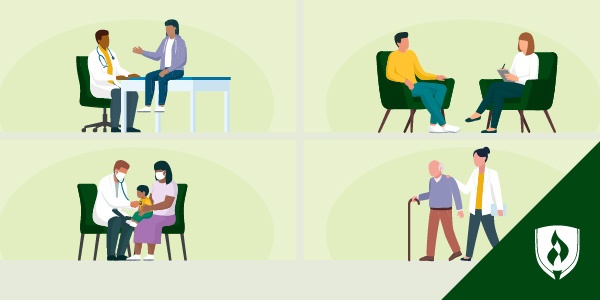
Will Erstad | 08.17.2022
This piece of ad content was created by Rasmussen University to support its educational programs. Rasmussen University may not prepare students for all positions featured within this content. Please visit www.rasmussen.edu/degrees for a list of programs offered. External links provided on rasmussen.edu are for reference only. Rasmussen University does not guarantee, approve, control, or specifically endorse the information or products available on websites linked to, and is not endorsed by website owners, authors and/or organizations referenced. Rasmussen University is accredited by the Higher Learning Commission, an institutional accreditation agency recognized by the U.S. Department of Education.

IMAGES
VIDEO
COMMENTS
Make these values and priorities stand out in your writing. 5. Highlight Your Strengths. Your essay is an opportunity for you to show what you are made of. Highlight all the things that are good about you, such as your education, your career, your background, and other experiences.
The video recommends applicants organize their statements in a five-paragraph essay format and write no more than 500 words. First paragraph: Make an immediate impact in your introduction. Second paragraph: Explain what attracted you to the program and field. Third paragraph: Compare your short- and long-term goals with the program goals.
To help temper your anxiety, this post elaborates on the importance of: Following directions. Being honest. Writing passionately and professionally. Making your case. Starting with an outline. Offering a story. Speaking the nursing language. Addressing your "red flags".
Motivation in the nurse practitioner career is very important. It is drive that gives you the reasons why you want to be a nurse, energy in order to keep working, set up new goals and accomplish them. There are several things that motivate me in my practice as a nurse practitioner. The first thing is passion in caring for others.
REASON #5: Higher earning potential. Another top reason why you should become a family nurse practitioner is the excellent earning potential. The average annual salary for the family nurse practitioner is $112,100. This number depends on variables such as working in a rural vs. urban community, private practice, or large organization.
As a nurse, I've worked with patients who require different levels of care. For some patients, I am the calm presence that offers reassurance in times of crisis. For others, I lend an ear to their thoughts; providing a distraction in the midst of all the chaos. This heightened ability to empathize with those in need has developed into an ...
3. Highlight your skills. It's helpful for a hiring manager to know what nursing skills you possess. Showcasing these skills and how you've applied them in previous roles can help the hiring manager determine your qualifications. For example, you can describe how, as an assistant nurse practitioner at the local clinic, you've become skilled at ...
They need to be treated with compassion; they need to be treated with respect. I feel like the nurse practitioner role [expands] to where you're spending more time with your patients and truly educating them about their conditions. "People do not need to be treated like a number. They need to be treated with compassion; they need to be treated ...
Keep it Simple - Admissions staff want to read an essay, not a novel. Avoid verbosity keeping your essay simple and succinct but complete. Make sure to stick to specified length guidelines. They are there for a reason. Understand the Role of a Nurse Practitioner -NP program faculty want to know that you understand the role of nurse practitioners.
Therefore, your "why I want to be a nurse" essay should emphasize your ability to be caring, empathetic, patient, and comforting to others. Share examples that showcase your natural inclination for caregiving: "Volunteering at the Red Cross shelter after the wildfires by comforting displaced families demonstrated my patience and ...
The rapid diagnosis and decisions made by the physicians along with the attentiveness of the nurses ultimately saved his life. Nurse practitioners have both of these qualities. I believe I have both the compassionate traits of a nurse and the focused mentality of a physician to become an exceptional medical care provider given the chance. This ...
The median income for Family Nurse Practitioners in 2017 was $110,930 per year, according to the Bureau of Labor Statistics. Comparatively the median salary for a Registered Nurse is $70,000 annually. In addition, family nurse practitioners have a lot more control over their career paths with options to open their own practice or practice as ...
A Family Nurse Practitioner (FNP) is an advanced practice registered nurse that specializes in health care across the age spectrum. They have great autonomy within the medical field, often acting as primary care providers, and have advanced skillsets to carry out patient care. For instance, FNPs conduct physical examinations, create treatment ...
Improved Professional Responsibility and Flexibility. Nurse practitioners (NPs) work in a variety of settings including clinics, hospitals, schools, urgent care centers, and private practices. With the skills to treat patients from onset of illness through recovery, FNPs may assess, diagnose, order tests, and even admit patients to the hospital ...
Reasons to Become a Family Nurse Practitioner. Greater Autonomy and Responsibility. Family Nurse Practitioners have a few duties that overlap with the duties of registered nurses; such as, examining patients, monitoring patient health, maintaining health records, etc. However, the duties of an FNP go beyond this as they can make a medical ...
Here are five great reasons to become a family nurse practitioner. You can develop a lifelong relationship with your patients. FNPs can treat patients of all ages. That means you can work with your patients throughout their life span. You can be the trusted health partner of your patients from childhood to old age.
Likewise, family nurse practitioners are in a unique position of understanding the impact of gender on health issues, access to care, and health status. Furthermore, I want to work with the underprivileged like my aunt does. "Nurse practitioners have been utilized to deliver primary care, traditionally in underserved areas or to vulnerable ...
The reason why I wanted to become a nurse is because it is so rewarding to make a difference in someone's life. It is a career that helps you save lives. It brings happiness to individuals and their families, and comfort those in need. Nursing is not for the faint of heart and requires a lot of sacrifice and patience.
19.04.2024. Cite this essay. Download. Nurse Practitioner is a great occupation for me because it satisfies my personality, interests, and values. I took two personality tests and it told me what kind of work I enjoy and how am I as a person. To begin with, my personality type according to the 16 personalities Myers Briggs test, is INFJ-A.
As a nurse, I want to pursue higher satisfaction than just checking off a list of things to do every day. I want to celebrate small victories with my patients and cultivate a growing passion for what I do. At the same time, I want to give back to my community by offering my services to the elderly who are not able to visit the local clinic.
You might be asking where do nurse practitioners work if you are looking to make a change from your current nursing role—or if you NPs appear in more places than you might think! We use cookies on our website to support technical features that enhance your user experience, and to help us improve our website.
Maybe you're a nurse practitioner interested in a multi-faceted doctoral degree, but a DNP/MPH isn't appealing. Instead, you may be interested in a dual family nurse practitioner (FNP) and PMHNP doctoral option, such as this program from The University of Arizona Online. The outcome is an FNP doctoral degree, but you'll also earn a ...